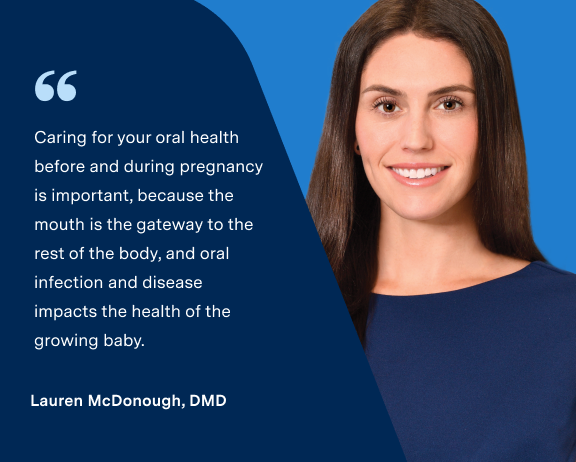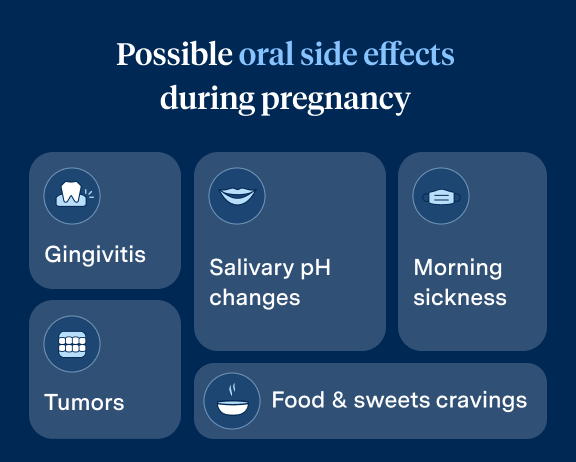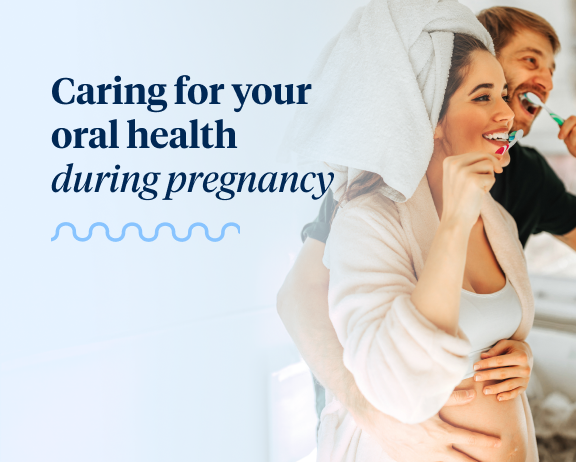Pregnancy and oral health
Embrace a healthy pregnancy by nurturing your oral health. Discover expert insights and tips to support your well-being.
The journey to motherhood is filled with excitement and important health considerations. Amidst the flurry of prenatal vitamins and doctor's appointments, oral health can’t be overlooked. Pregnancy brings about hormonal changes and lifestyle adjustments that can greatly affect your dental health. This guide is designed to help you navigate through these changes, ensuring your smile remains bright as you prepare to welcome new life. It's all about understanding the changes happening in your body and the steps you can take to maintain optimal oral health.

How pregnancy hormones impact oral health
Throughout pregnancy, a woman's body experiences a fluctuation of hormones. The primary hormones that can have an impact on dental health are:
Estrogen: Estrogen increases the prevalence of gingival inflammation and lends to the progression of gingivitis, leading to what is known as pregnancy gingivitis.
Progesterone: Progesterone also increases inflammation to the gums, while also potentially making you more susceptible to gingivitis, tooth decay and possibly gum infection in rarer cases.
While these hormone surges and fluctuations can’t be avoided, there are extra precautions you can take to mitigate added oral health issues before, during and after pregnancy. Read on to learn more.

Dental preparations before pregnancy
Before venturing into the beautiful journey of motherhood, preparing your dental health is just as important as any other aspect of prenatal care. Dental issues, especially infections, not only pose risk for the expectant mother but also for the baby, as infection can spread through the umbilical cord or through breast milk and infect the baby.
Aspen Dental dentist, Dr. Lauren McDonough, DMD weighs in on the health implications for both the mother and the baby:
“Caring for your oral health before and during pregnancy is important, because the mouth is the gateway to the rest of the body, and oral infection and disease impacts the health of the growing baby. As we raise our children, sharing kisses and utensils can put the baby in jeopardy of transmissible bacteria. Not all bacteria is bad bacteria— but it’s important to care for your own oral health as much as it is to focus so intently on caring for your baby’s health to create a healthy future.”
This is why oral health is an essential part of your pregnancy journey. Here’s how future moms can ensure their oral health is ready for the changes pregnancy brings.
Comprehensive dental check-up
A comprehensive dental check-up to go over all your past, present and future oral care needs will ensure you get any treatments and procedures you’ll need before becoming pregnant, what to prepare for when you are and what to expect postpartum. This check-up can reveal any existing issues that need immediate attention, such as cavities, gum disease or any other oral health concern that could complicate or be aggravated during pregnancy.
Treating existing dental issues
Your dentist will be able to diagnose your needs when you go in for your check-up, but some procedures to consider addressing before becoming pregnant are:
Wisdom teeth removal: If your dentist recommends removal to prevent potential complications like infection or pain caused by wisdom teeth eruption, it's best to address this before pregnancy.
Filling cavities: Treating cavities before pregnancy helps avoid the need for emergency dental work later on. Fillings remove decay that if left untreated can cause more significant issues like root canals.
Root canal treatments: If you have a tooth that is severely decayed or infected, a root canal may be necessary. Completing this treatment before pregnancy will help avoid the risk of further infection and alleviate discomfort.
Gum disease treatment: Since pregnancy can lead to increased risks of gum disease due to hormonal changes, addressing any current gum disease will keep your mouth healthy and free from infection and decay. Periodontal treatments might be recommended by your dentist.
Fluoride and tooth remineralization treatments
Fluoride treatments can strengthen your teeth and help prevent cavities during pregnancy. Discuss with your dentist if this preventative treatment is appropriate for you.
Discussing future dental work
If you're planning major dental work such as teeth straightening or cosmetic dentistry, consult with your dentist on the timing. Some procedures might be more comfortably completed before pregnancy, while others can wait until after your baby's birth.
By addressing these dental needs before pregnancy, you can reduce the risk of emergencies, minimize discomfort, and focus on the joy of becoming a mother with one less worry.
Your oral health during pregnancy
The phrase 'eating for two' extends beyond nutrition. Oral health is a major facet. Now that you’ve done all you need to pre-pregnancy, it’s time to prepare oral health during pregnancy. We’ll explore the ways pregnancy can impact your oral health.

How pregnancy affects your teeth and gums
Pregnancy gingivitis
During pregnancy, your body experiences surges in progesterone and estrogen. These changes can exacerbate the way your gums react to plaque, leading to inflammation known as pregnancy gingivitis. Swollen, tender gums that bleed more easily might become part of your daily oral hygiene routine, but they should not be ignored.
Pregnancy tumors
In rare cases, women may develop a condition called pregnancy tumors, which are non-cancerous growths on the gums stemming from excess plaque.
Morning sickness
For some women, the oft-dreaded morning sickness can bring acid from the stomach into the mouth, a prime factor for dental erosion. Frequent vomiting can erode the enamel of your teeth, leaving them susceptible to decay and sensitivity. Pregnant women who suffer from morning sickness are at risk of increased dental erosion.
Salivary pH changes
During pregnancy, you may experience an increase in thicker, rope-like saliva. This change can cause the mouth to become more acidic, leading to heightened cavity risk, as saliva plays an important role in maintaining the mouth's natural pH balance and can counteract acids that cause decay. Pregnant women might notice a shift in the taste of their saliva as well as a propensity for dry mouth or unusual tastes, all symptoms of the body's reaction to new hormone levels.
Food and sweets cravings
Pregnancy cravings can heavily influence your diet and, consequently, your dental health. The increased consumption of sugars or changes in eating schedule can impact oral hygiene, and an increase in sugars can also increase the chances of plaque and cavities.

Myths and misconceptions around pregnancy and oral health
There are many old wives' tales surrounding pregnancy and oral health. Some are true and some are completely false. Let’s demystify some of these popular misconceptions. Here are some common myths and facts about pregnancy and oral health:
Myth: “You lose a tooth for every baby”
Reality: This common belief is not true. While pregnancy does not directly cause tooth loss, neglecting oral hygiene during this time can lead to dental issues. This ominous myth, that pregnancy costs a woman a tooth, has its roots in poor understanding. Pregnancy doesn't actually cause women to lose teeth, but neglecting oral hygiene might.
Myth: “Dental anesthetics and X-rays are harmful during pregnancy”
Reality: Digital dental X-rays produce very low levels of radiation and are considered safe during pregnancy. Modern dental X-rays produce very low levels of radiation. However, it’s always best to consult your OB-GYN for any kind of X-rays you need done, including dental.
Local anesthetics, like lidocaine, are also considered safe for use during pregnancy. Lidocaine, the most commonly used local anesthetic during dental procedures, is classified as a category B drug and “considered to have almost no negative effect on the mother and the fetus”. Local anesthesia can be used safely to perform essential dental procedures, minimizing pain and stress which can also negatively affect the pregnancy.
The American Dental Association (ADA) and the American College of Obstetricians and Gynecologists (ACOG) both agree that preventive, diagnostic and restorative dental treatments are safe throughout pregnancy and are effective in improving and maintaining oral health. Although, the ACOG does advise postponing elective general surgeries until after pregnancy. The key is to communicate with both your dentist and your obstetrician about any treatments or procedures.
Myth: “The baby robs your calcium from your teeth, leading to tooth decay”
Reality: The baby does not deplete calcium directly from the mother's teeth. Calcium needs for fetal development are met through the mother’s diet. Adequate dietary calcium is essential to prevent dental health deterioration. Despite what folklore might suggest, the baby doesn't take your calcium—or any other nutrient—directly from your teeth. It's more likely that changes in diet and oral care play significant roles in tooth health.
Myth: “Morning sickness doesn’t impact oral health”
Reality: Regular vomiting associated with morning sickness can erode tooth enamel, increasing sensitivity and the risk of decay. Vomiting can cause the pH level to drop in your mouth, creating an acidic environment that weakens enamel. It’s imperative to manage oral hygiene meticulously during these episodes.
Myth: “Pregnancy gingivitis isn’t that serious”
Reality: The infamous 'pregnancy gingivitis' isn't a myth—it's a widespread phenomenon. Hormonal fluctuations can make your gums tender, inflamed and more likely to bleed, even during routine cleaning. Pregnant women are at greater risk for gum disease (pregnancy gingivitis) and growths within the mouth (pregnancy tumors). Studies have shown a connection between periodontal disease in expectant mothers and premature deliveries resulting in low-birth-weight babies.

Dental care during pregnancy
Keeping your oral health in check during pregnancy is vital for both you and your baby's well-being. Here are some tips to help you maintain good dental hygiene during this crucial time.
Keep a healthy diet
Maintaining a balanced diet full of essential nutrients like calcium, vitamins A, C, D, and others can help keep your teeth and gums healthy. These key nutrients also contribute to the development of your baby's teeth and bones. In addition, combining calcium with these vitamins increases their absorption so they are more effective when taken together.
Brushing twice a day
Pregnancy can cause changes in hormones, leading to an increased risk of plaque and gingivitis. Regular brushing twice a day with a soft-bristled toothbrush can help remove any plaque build-up and prevent gum disease.
Flossing daily
Flossing daily is essential for removing food particles and plaque from between your teeth, which can cause decay or contribute to gum disease. Consider using an interdental brush or water flosser if flossing becomes challenging during pregnancy due to gag reflex.
Watch your sugar intake
Sugar consumption can increase the risk of cavities in both expectant mothers and their babies. Avoid excessive sugary snacks and opt for healthier alternatives.
Limit acidic foods
Pregnancy can make your teeth more sensitive to acidic foods, leading to enamel erosion. Limiting or avoiding acidic foods like lemonade, pickles or tomatoes can help protect your teeth.
Rinse with water after vomiting
Frequent episodes of morning sickness can expose your teeth to stomach acid, causing erosion and sensitivity. Rinsing your mouth with water or remineralizing mouthwash after vomiting helps neutralize the acid and prevent damage to your teeth.
Managing tooth pain during pregnancy
Tooth pain during pregnancy is not uncommon, given the increased vulnerability to oral health issues due to hormonal changes. If you experience toothache, start with gentle oral hygiene practices, including careful brushing with a soft-bristled toothbrush and flossing to remove any food particles that may be exacerbating the pain. Applying a cold compress externally to the cheek can also help reduce swelling and numb the pain temporarily. Over-the-counter pain relievers should be used cautiously and only after consulting with your healthcare provider to ensure they are safe for pregnancy.
Visit your dentist regularly
Regular dental check-ups are essential during pregnancy to monitor your oral health. Inform your dentist about any changes in medication or health conditions as well while also consulting with your OB-GYN.
Inform your dentist of your pregnancy
Inform your dentist about the stage of pregnancy and any other relevant medical information. Some procedures may be recommended to wait until after you have given birth.
Consider postponing elective procedures
Some dental procedures that are not urgent may need to be postponed until after delivery. Consult with your dentist and OB-GYN before scheduling any non-essential procedures during pregnancy.
By following these guidelines, you can maintain good oral hygiene and ensure the health of your baby during pregnancy. Remember, dental care is an essential part of prenatal care, so be sure to prioritize it for a happy and healthy motherhood journey.

Preparing for your postpartum dental journey
After delivery, your hormone levels will normalize, and several side effects can come to an end, including the symptoms associated with pregnancy gingivitis. However, hormone shifts can also lead to other oral health conditions, so maintaining your oral hygiene habits postpartum remains just as important. Here are some things to consider:
Make time for dental appointments
With the demands of new motherhood, it can be challenging to prioritize your own dental health. It might help to schedule your dental appointments in advance or at the same time as your baby's well-child checkups to ensure you don’t neglect your own care. Just remember that certain dental procedures involving antibiotics and other medications may not be safe while breastfeeding. Consult with your doctor before you begin these treatments.
Oral health is self-care
While caring for a newborn, your own wellness often takes a back seat. Recognize that your oral health is an essential part of your overall well-being, and attending to it is a form of self-care that benefits both you and your baby. Your oral health is an investment in both your and your baby's well-being.
Coping with oral health anxieties during pregnancy
Pregnancy is a time of heightened emotions, and anxiety over oral health can unnecessarily take up space in your mind. Many expectant mothers worry about the impact of dental visits on their pregnancy, exacerbating stress levels. Remember that maintaining oral health is key to overall well-being during this period and professional guidance can ease these fears.
Lean on professional support
Your dental care team is more than clinicians; they are your partners in health, empowering you towards a healthier lifestyle. Regular dental visits offer not just treatments but also a wealth of knowledge and reassurance, tailored just for you. Each visit is a positive step forward in your health journey, aiming for a brighter and healthier smile.
Practice relaxation techniques
Stress can wreak havoc on your oral health, exacerbating conditions like gingivitis. Practicing relaxation techniques can significantly mitigate stress's impact on your overall health, which may exacerbate the likelihood of gingivitis. By incorporating stress-reducing activities like yoga or meditation into your daily routine, you can promote overall well-being and protect your overall health. Engaging in these practices regularly can help maintain a healthy balance and prevent stress-related oral health issues.
Engage in community
Sharing experiences with other expecting mothers can be comforting, particularly when you realize you're not alone in concerns you might have. This sense of community fosters a supportive environment where you can find advice, empathy and encouragement. It also allows you to share your own journey, offering insights that could help someone else in their path.

Aspen Dental is here for you in every chapter of life
Pregnancy marks a beautiful new chapter in life, filled with both joyful and challenging moments. During this time, oral health becomes even more critical, profoundly affecting both your well-being and your baby's development. Staying informed about oral hygiene, practicing diligent oral care and maintaining open communication with healthcare professionals are vital steps to ensure your dental health thrives during this period.
Remember, prioritizing dental care before, during and after pregnancy isn't just about preventing issues—it's about laying the foundation for a healthy smile for both you and your child's future.
Ready to ensure your smile is as healthy as it can be during this special time? Schedule your appointment with Aspen Dental today where your oral health is our top priority. Let's set the stage for a radiant smile that lasts a lifetime.

